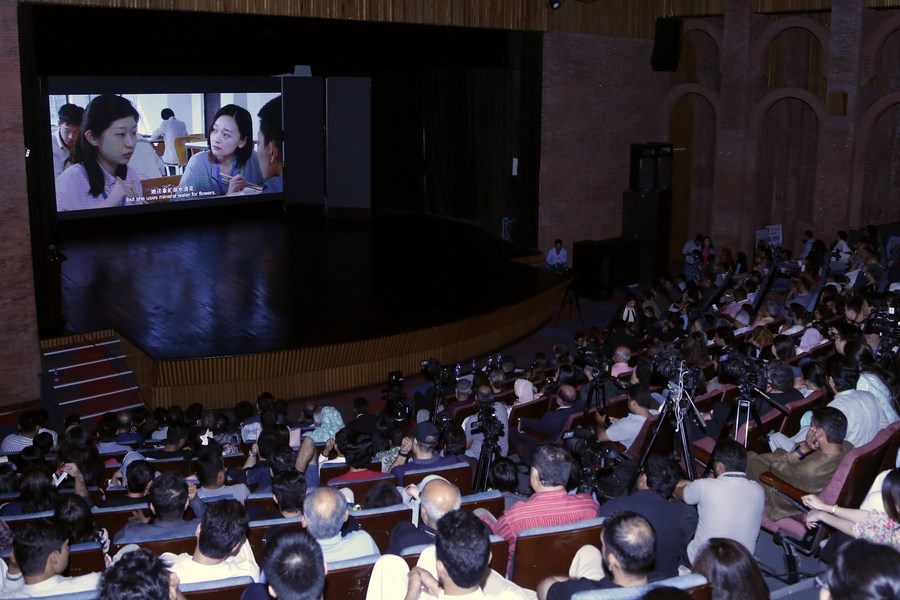DM Monitoring
ISLAMABAD: On an early August evening, a pin-drop silence enveloped the space in the main auditorium of the Pakistan National Council of Arts despite the presence of hundreds of people who were completely engrossed in a film co-produced by Pakistani and Chinese producers.
The audience was captivated by a young Chinese lady’s journey from China to Pakistan through the Karakoram highway to work as a translator at a China-built hydropower project providing cheap and clean electricity to Pakistan.
The previously serene atmosphere in the auditorium was suddenly filled with a loud round of applause and cheers from the audience when, in a movie scene, the Chinese lady wanted to pay the bus fare for her ride, but the Pakistani driver warmly refused, saying, “No need to pay by Chinese people! Pakistan and China are real brothers!” The crowd joyously chanted, “Yes, it’s true!”
The first major co-production by Pakistani and Chinese producers, the film “Ba’Tie Girl”, which means the girl from ironclad-brotherly Pakistan, revolves around the friendship between a Chinese lady and a Pakistani teenage girl who both share a love for football.
As the story developed, the Chinese lady acted as a rock-solid support for her Pakistani friend, empowering her to discover her inner strength and bravely confront the hardships that came her way, eventually overcoming the challenges.
“The Chinese lady’s character reminded me of China, which always backs Pakistan and proves to be its unwavering pillar of support in all testing times,” Khalid, who came from the Attock district of Punjab to watch the movie, told Xinhua.
Launched in 2013, the China-Pakistan Economic Corridor (CPEC), under which China invested multibillion dollars in Pakistan to help the country overcome its electricity shortage by building power plants and enhancing connectivity by spreading a network of roads across the country, has enhanced people-to-people contacts in Pakistan. Following the launch of the CPEC a decade ago, thousands of Chinese workers and engineers came to Pakistan on CPEC projects, and hundreds of thousands traveled to China for education, professional training, business, and other opportunities.
Talking to Xinhua about people-to-people contact, the film’s Pakistani co-producer Syed Jamal Shah said that the journey of the young Chinese lady to Pakistan and her interaction with Pakistani culture in the co-production gives a good glimpse into the culture of both countries.
“Trade and commerce under the CPEC have great economic importance, but building bridges through art and culture means a lot because these bridges are much stronger and long-standing as they bring people closer to each other,” Shah said.
Talking to Xinhua about the driving factor behind co-producing the movie, the Chinese producer Xie Peng said that through different incidents, he realized the strong bond of friendship between China and Pakistan and witnessed many stories that could be shown in the friendship between the two countries.
The co-production is being seen as the first major step towards long-awaited Pakistan-China cooperation in the field of films and dramas, aimed at reviving Pakistan’s film industry.
Talking to Xinhua, Zafar Uddin Mahmood, special assistant to the Prime Minister of Pakistan and former special envoy for the CPEC, said the movie will inspire other filmmakers to work in co-production with China.
The co-production also proved to be a good learning experience for the Pakistani cast, mostly comprising young actors, some of whom also learned the Chinese language for the movie mainly shot in English and Chinese languages.
Suraj Khan, one of the main leads on whom the audience heaped praises for his comic performance, said that he has acted in different theaters and TV dramas in Pakistan, but “Ba’Tie Girl” has been his most memorable experience.
The movie is scheduled to hit cinemas next week, and it is anticipated to attract a substantial audience due to its engaging storyline, the celebration of Pakistan’s friendship with China, and its unique appeal as one of the very few commercial movies co-produced with a foreign country.






